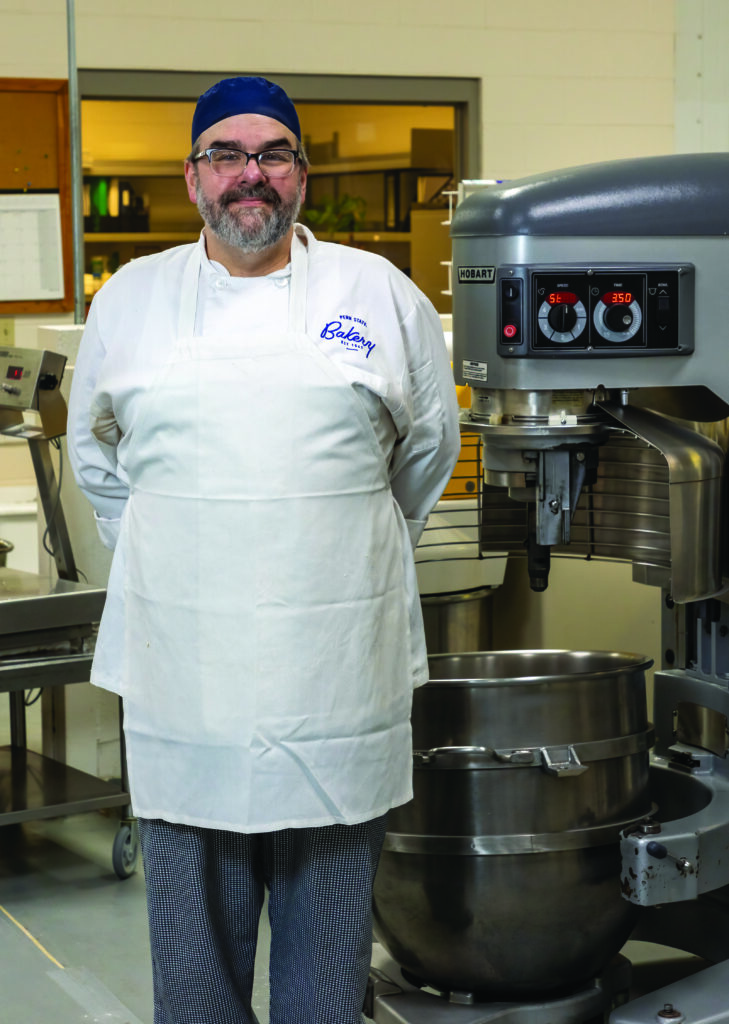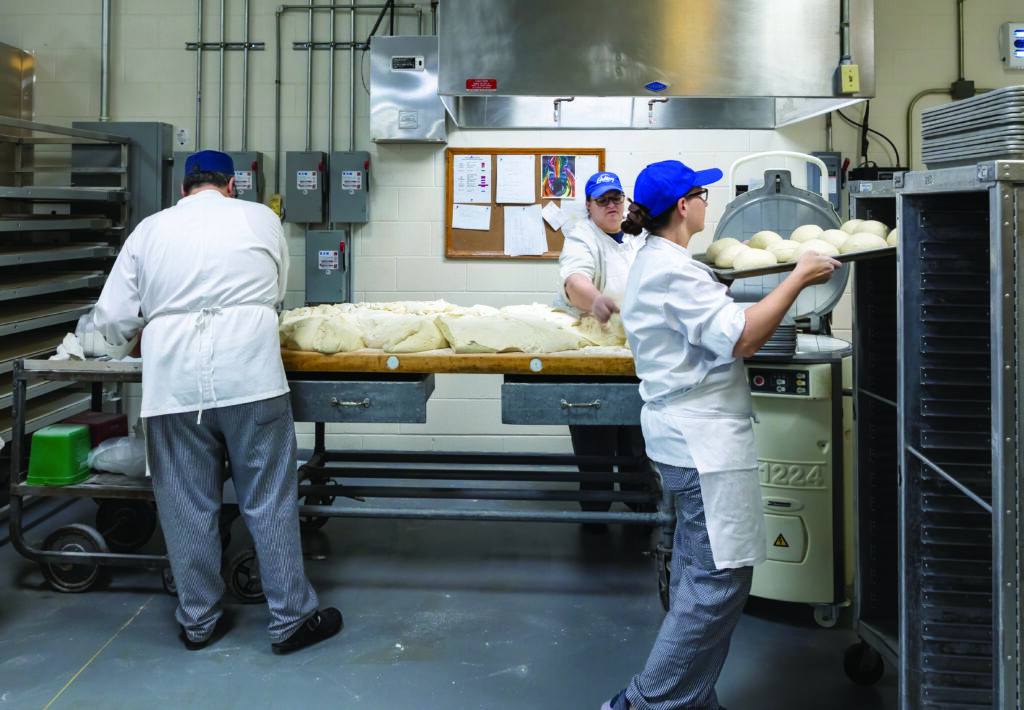From flaky croissants to artisan breads to beloved chocolate chip cookies, the Penn State Bakery’s fresh baked goods can be found at just about every meal that is ever served at most Penn State campuses.
Penn State Bakery breads and pastries are available at every dining area, individually-wrapped bakery items are sold at every campus convenience store, its intricate gourmet desserts frequently grace banquet tables at the Penn Stater Hotel & Conference Center, its cookies are used in Berkey Creamery ice cream sandwiches, and tins of bakery goodies are shipped to alumni and fans across the continental United States.
The availability of this homemade goodness has become so ubiquitous at Penn State, it can be easy to take it for granted. But as the Penn State Bakery celebrates its 75th anniversary during this 2022-23 academic year, it’s an appropriate time to appreciate just how special this Penn State institution is.
Expansion and growth
The Penn State Bakery has come a long way from its humble beginnings in 1947, when it served a pretty basic, practical function, making rolls, sandwich breads, and simple desserts for University Park’s residence hall dining facilities.
The bakery was formerly located across Atherton Street from campus, behind the old bus station. The building also housed a food service warehouse, commissary, and butcher shop. Back then, the bakers had to wear hard hats in the kitchen as a safety precaution because conveyor belts and bread proofing ovens were located overhead, according to John Mondock, director of Housing and Food Services purchasing, warehouse, distribution, and bakery.
In 1991, the bakery moved to its current location within the HFS Building on Services Road, adjacent to The Arboretum at Penn State. Within the new modern space, the bakery was soon able to expand its services to include specialized desserts for special events, the Penn State hotels, catering, and the dining commons, Mondock says.
Today, the bakery encompasses 10,000 square feet. A maze of hallways lined with walk-in freezer and cooler spaces, temperature-controlled dry storage and scaling rooms, offices, and lots of rolling holding cabinets leads to the main production area, an expansive open space buzzing with activity and awash in blue, white, and stainless steel.
Most of the bakers wear white bakers’ uniforms and aprons, and they’ve traded in hard hats for blue Penn State Bakery baseball caps. They work amid a sea of stainless steel tables, sinks, pots and pans, vats, tables, fans, trays, more holding cabinets, and, of course, appliances: wall ovens, proofing ovens, hearth ovens, blast freezers, giant mixers, and specialized appliances like dough sheeters and slicing machines—many powered by air compression lines that hang from the ceiling.
Finished products are wrapped, boxed, and labeled by hand in a packaging area before being placed in freezers or immediately sent to the huge HFS warehouse down the hall, from which they are shipped and delivered across the local campus and to other Penn State campuses.
Essential employees
The bakery is a well-oiled, massive operation, pumping out eye-popping quantities of product: 400 dozen cookies per day, 190 pounds of granola three times per week, 100,000 loaves of bread per year. All of this production is even more impressive when you consider the fact that it’s being done with a staff of less than fifteen people.
Bakery employees are considered “essential” by university standards, meaning they work during snow days and other university closures, including spring break and winter break, when they focus on building up their freezer stock.
For most bakery employees, the workday begins before dawn and ends in the early afternoon. With no evening or weekend shifts, the hours are considered desirable by food service standards, and as such, the bakery has become a coveted job location.

“Penn State is a great place to work, with many folks spending most of their career here,” Mondock says.
In fact, the bakery’s transformation from utilitarian and basic bakery to the wide-ranging operation it is today can at least partially be credited to the talent and skills of some of its longtime career employees, including Kris Patterson, the head artisan bread baker who has been with the bakery for over twenty-five years, and Heather Luse, former executive pastry chef, who retired last year after nearly thirty years of service.
Patterson and his staff shape every loaf of bread by hand. In addition to year-round staples like homestyle and sourdough breads, Patterson comes up with a “bread of the month” to be sold to the public at Lion Surplus every Friday. These less-common mouth-watering treats have included flavors like chocolate sourdough bread, rosemary olive oil bread, autumn harvest bread, and black beer bread.
“Kris has pretty much crafted all those bread recipes. He is a genius; he can just look at dough and tell you what it needs,” Mondock says.
The department is currently looking for someone to replace Luse, who managed just about every aspect of Bakery operations. It will not be easy.
“Heather had a unique skillset. She described herself as growing up here. She knew everyone, and just had so much knowledge about everything,” Mondock says.
To work in the bakery, all job applicants must pass a basic math test. Beyond that, the testing and training required depend on the position. Some jobs simply require a background in food service, while specialty positions require applicants to replicate a decorated cake or to mix and shape loaves of bread. The bakery, which falls under the Auxiliary and Business Services unit, also often employs student interns from Penn State’s School of Hospitality Management.
All Penn State Bakery items are labeled after being nutritionally evaluated by registered dietitians who work in the Department of Housing and Food Services. While the bakery does offer “gluten-friendly” options and makes note of other allergens, they acknowledge on their labels that cross-contamination can occur due to the way the facility is set up.
Creating traditions
The Penn State Bakery prides itself on the fact that none of its products contain added preservatives. This means everything they produce is meant to be consumed within two or three days of purchase—which usually isn’t very difficult to do, as evidenced by the way the Penn State community has embraced the bakery’s popular treats, sometimes with a cult-like fervor.
For a touch of Penn State blue and white, customers flock to the bakery’s signature sprinkle cookies, often decorated with a pawprint. This year, the bakery is selling a special “Anniversary Cookie” in honor of its 75th anniversary, featuring dried blueberries, white chocolate chips, and diamond crystal sugar. But the bakery’s longest running bestseller by far is the simple chocolate chip cookie, a million of which are sold every year.
Over the past decade, a version known as the “West Cookie” has attained legendary status on campus. This cookie, which is sold only in the West Food District at Waring Commons, uses the same dough as all other chocolate chip cookies from the Penn State Bakery. The difference is, it is baked fresh on site at the West Halls eatery, slightly undercooked, giving it a warm, gooey texture that has made the cookie the subject of Facebook fan pages, YouTube videos, and student newspaper articles.
The bakery collaborates with another Penn State institution, the Penn State Berkey Creamery, to create other traditions, as well.

“The Penn State Bakery is very proud to be a part of Penn State traditions. In recent years, the bakery has been working closely with the Berkey Creamery on a number of projects, including providing cookies for their ice cream sandwiches, and most recently on a new location at the HUB, Cow and Cookie, that combines fresh bakery treats with creamery ice cream,” Mondock says.
Cow and Cookie is currently a food stand inside Sbarro at the HUB, with plans to become a brick and mortar shop there. In addition to baked goods offered there, the bakery provides the mix-ins for the popular “Quake”—a blended frozen treat similar in concept to a Dairy Queen Blizzard. For example, Cow and Cookie recently featured a Red Velvet Whoopie Pie Quake, featuring pieces of Penn State Bakery red velvet whoopie pies mixed into Berkey Creamery ice cream.
Over the past 20 years, the bakery has also created a tradition for families of current students. For birthday celebrations, finals week sustenance, get-well wishes, or “just because,” parents can order bakery care packages—deliveries of things like cookies, cupcakes, or personalized cakes—for their students. Last year alone, the bakery delivered almost 3,000 care packages, Mondock says.
Fortunately, Penn State Bakery products are not just for students. In addition to the bread that is for sale every Friday at Lion Surplus, the public can visit pennstatebakery.com to order personalized cakes, specialty desserts, donuts, cookie platters, and more, to be picked up at the HFS Building on campus. Cookie tins can also be purchased for delivery anywhere in the continental United States. T&G
Karen Walker is a freelance writer in State College.



